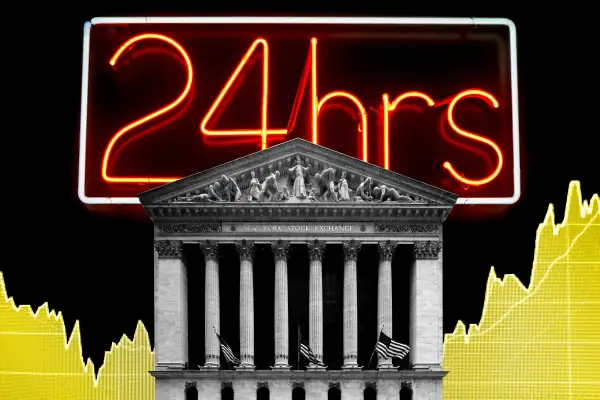Should the New York Stock Exchange Be Open 24 Hours a Day?
Money is not a client of any investment adviser featured on this page. The information provided on this page is for educational purposes only and is not intended as investment advice. Money does not offer advisory services.

Currently, the New York Stock Exchange’s core trading hours are 9:30 a.m. to 4 p.m. ET, Monday through Friday. But it hasn’t always been that way.
In the early days of the NYSE, per its website, “brokers gathered twice a day to trade a list of 30 stocks and bonds,” then “from the podium the president called out the name of each security in turn, while the brokers shouted bids and offers from the chairs assigned to them.” (Sounds chaotic.)
By the 1870s, they'd determined that specific trading hours were necessary and developed a schedule that has been tweaked several times in the past few centuries. Now, we may be looking at another adjustment.
A few weeks ago, the Financial Times reported that the NYSE has begun “polling market participants on the merits of trading stocks around the clock.” And while the NYSE is just one stock exchange of many, it is the world's largest, so this would be a big shift with major repercussions.
“If you want to go onto Amazon and pick up a sweater or something, it's available to you 24/7,” says Andrew Crowell, vice chairman of wealth management at D.A. Davidson. “We’re in an on-demand world now.”
Is it time for the New York Stock Exchange to catch up?
Merits of round-the-clock stock trading
Having this discussion now actually makes a lot of sense, according to Stephanie Guild, head of investment strategy at Robinhood. Stock trading has become increasingly electronic over time, but the rise of cryptocurrency — which trades nonstop — has given the conversation new urgency.
So has the uptick in digital traders participating in existing after-hours markets. Robinhood, for instance, offers 24-hour trading for certain stocks and ETFs five days a week. It’s seen over $10 billion in overnight trades since launching in May 2023.
Increasing global market demand is a factor, as well. Guild says currency values are partially driven by a difference in interest rates. As you know unless you've been living under a rock, the U.S. has had especially high interest rates lately, which has supported a strong dollar and increased interest in U.S. equities.
But if you’re an investor living in another country who wants to invest in the U.S. market to take advantage of this, the NYSE hours can be challenging: “You’d be up in the middle of the night,” Guild adds.
The exchange's current hours of operation can be a hurdle for U.S. investors, too.
Crowell says a 24-hour market would be convenient for traders who have theories they'd like to test out by buying or selling shares ahead of open.
“People want to express their investment philosophy, and they don't want to wait for the whole world to wake up,” he adds. “They want to be able to silently get ahead of the crowd.”
Cons of a 24/7 NYSE
While expanded hours would give investors the opportunity to follow through on their instincts, a decision by the NYSE to move to round-the-clock hours could also come with negative consequences.
For one, the 9:30-to-4 schedule serves as sort of a guardrail, preventing many investors from making impulsive decisions in reaction to their emotions or the news.
That's no small thing, since research suggests that the most successful investors are usually the ones who ride out the highs and lows and stay committed to their overarching goals... which could be undone by having access to the market a 24/7 (or 24/5, for that matter).
“The long-term goal is to allocate properly, hold on and be committed to your investment plan,” Crowell says. “I do worry that on a 24-hour, Monday through Friday exchange, people will panic at the wrong time — that second glass of Chardonnay is not a good precursor to making a buy or sell decision on a Tuesday night.”
There’s also a risk associated with price discovery, which is the act of determining a price for an asset. Because volumes are highest at the opening and closing bells, Crowell says, that’s when investors can get the truest reading of what something is worth.
“To get the most accurate, available price in the marketplace, you want to have the most trading volume possible,” he says. “The difficulty with a 24-hour exchange would be that if Julia wants to sell her shares at 2 in the morning, there's going to be a buyer — but that buyer could have an undue impact on being able to dictate price to you.”
Admittedly, not everyone would upend their schedules immediately. Guild predicts the largest volume of stock trading would still come from U.S. institutions, and those trades would still happen during the day, if the NYSE were open 24 hours.
That means it would be extra important for traders to be careful about what they're getting into, given that the market can react in one way during lower-volume sessions and a different way way during high-volume ones.
Even so, Guild says she's hopeful a 24-hour stock market would make price movement a little less volatile. Think: If expanded hours led to more round-the-clock volume, we could see more diverse opinions about a stock rather than just a few players’.
And if those players are smart about it, they could make this work to their advantage.
“If you really are committed to staying disciplined, being able to trade 9 o’clock at night Eastern shouldn't change your strategy,” she says.
More from Money:
Should I Buy Stock in Companies I Like?

